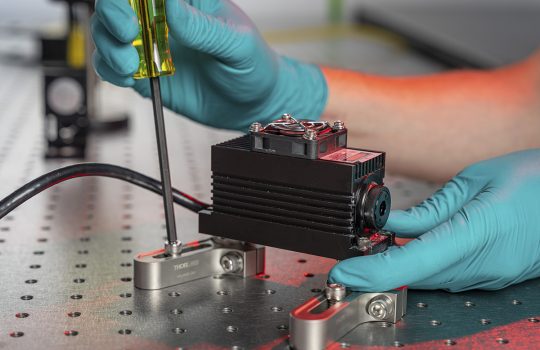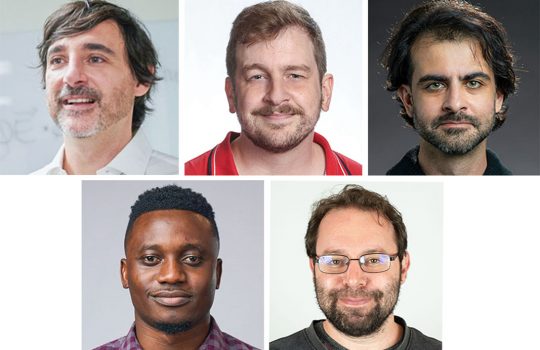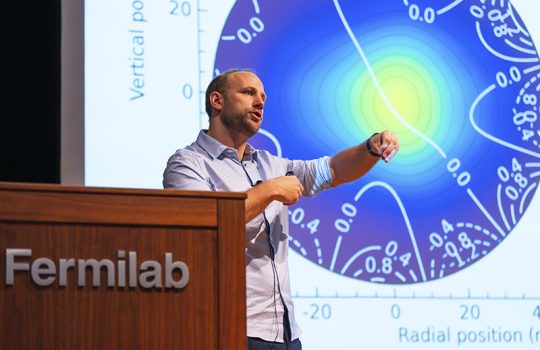The U.S. Department of Energy’s Fermi National Accelerator Laboratory hosted an event today to kick off the U.S. Quantum Information Science School, one of the largest federally sponsored education programs to help build a quantum-ready workforce.
“The Quantum Information Science School is a unique program that will extend the amazing opportunities of this emerging field to a diverse group of participants—a top priority for the Department of Energy,” said Asmeret Asefaw Berhe, DOE’s director of the Office of Science. “Programs like this strengthen and advance the U.S. science and technology enterprise by broadening participation of people from all walks of life in STEM fields and ensuring equitable access to the benefits of new and emerging technologies and scientific innovation.”
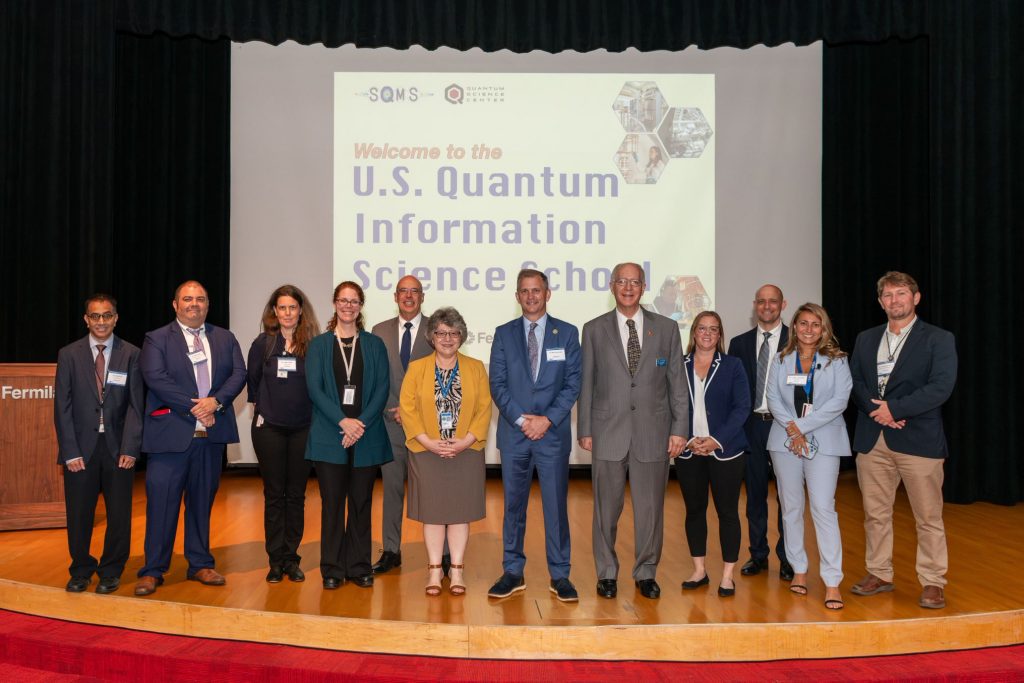
Delegates from the U.S. Department of Energy, White House Office of Science and Technology Policy, Fermilab Directorate, U.S. Congress and leadership from the National Quantum Information Science Research Centers inaugurated the first USQIS school on Aug. 7. Photo: Ryan Postel, Fermilab
As part of the inauguration for the first QIS program session, participants heard from notable guests, including Charles Tahan, the assistant director of quantum information science from the White House Office of Science and Technology Policy; U.S. Reps. Sean Casten (Ill.) and Bill Foster (Ill.); Fermilab Director Lia Merminga; SQMS and QSC Centers’ Directors Anna Grassellino and Travis Humble; and welcoming remarks from Berhe, who attended the event virtually.
The school’s organization is led by the Fermilab-hosted SQMS Center, in collaboration with the Quantum Science Center, hosted by DOE’s Oak Ridge National Laboratory, and draws on experts from all five DOE Office of Science Quantum Research Centers. Each of the five is comprised of national lab, academic and industry collaborators, ensuring a nation-wide effort to advance quantum information science and technology. The school, mirroring the structure of the five centers, unites experts, beyond-the-state-of-the-art facilities and the next generation of the quantum workforce.
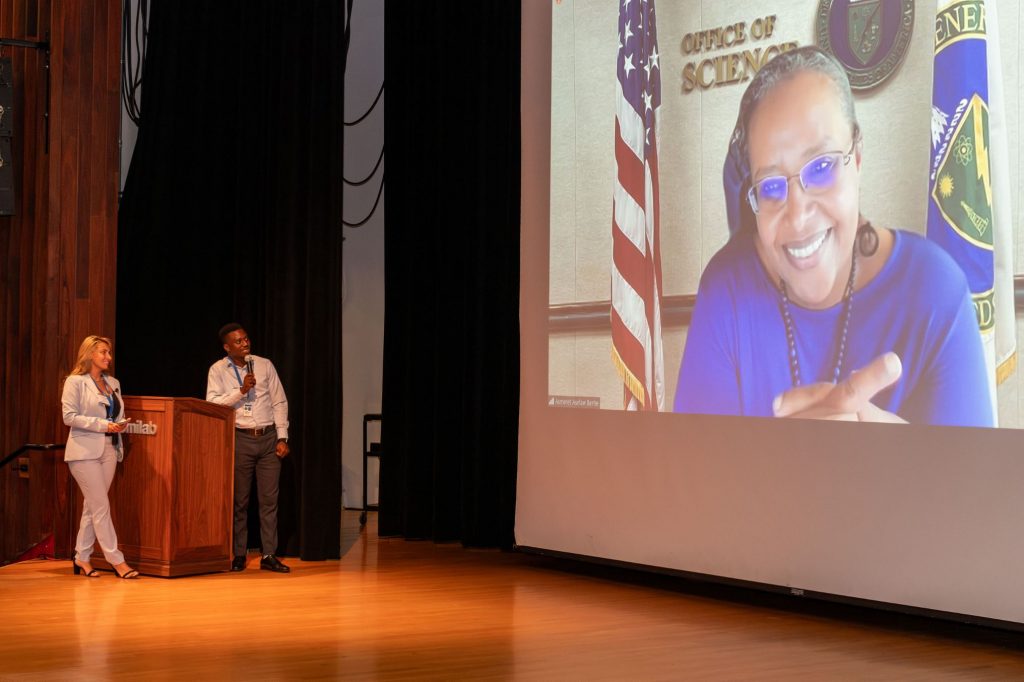
Oluwadara Ogunkoya (middle left), the SQMS Center Carolyn B. Parker fellow, asks Asmeret Asefaw Berhe, director of the DOE Office of Science, why is quantum information science important for the DOE Office of Science. Photo: Ryan Postel, Fermilab
“Illinois is a global leader in quantum research, advancement and commercialization, with the opening of the first U.S. Quantum Information Science School putting us one step closer to transforming the way so many of our sectors operate,” said Illinois Gov. J.B. Pritzker. “We’re proud to be the state with the highest quantum investment and the most centers in the United States, and this program will keep us at the forefront. Our top asset has always been our people—this new, innovative opportunity will keep preparing our top-tier workforce for the jobs and challenges of the future.”
Nearly 150 students from across 70 institutions will spend 10 days at Fermilab building theoretical knowledge and practical experimental skills in the field of quantum information science. The participants represent a broad range of experience and backgrounds, including undergraduate and graduate students from across the U.S., educators, federal labs and industry professionals.
The USQIS school is structured to host morning lectures by world-leading experts in QIS, followed by afternoon sessions where participants dive deeper into the subject matter using SQMS Center laboratories and equipment. The program will cover a range of topics in QIS, including quantum device controls and measurements; quantum computing algorithms; quantum sensing; quantum device design and fabrication; cryogenics; and material science. Beyond the coursework and lab time, multiple panel discussions, poster sessions and networking opportunities will enrich the USQIS school.
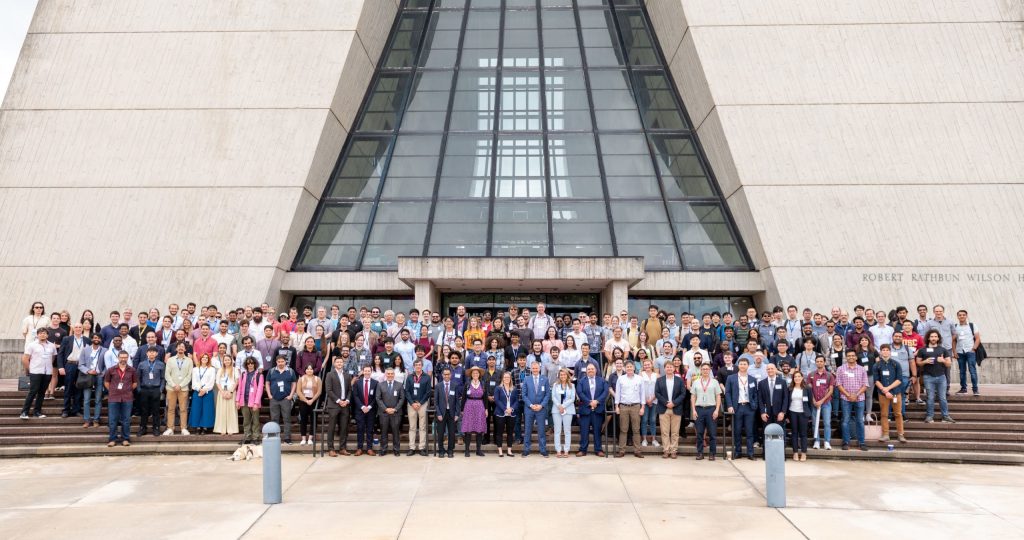
Students from the USQIS school and notable guests gathered outside of Fermilab’s Wilson Hall on Aug. 7. Photo: Ryan Postel, Fermilab
“With the new USQIS school, we want to offer an education program that gives an opportunity to engage in 360-degree, interactive, hands-on learning, the likes of which is currently out of reach for many who are interested in the rapidly expanding field,” said Grassellino. “These technologically advanced and sophisticated facilities are not widely available, and we believe that the DOE centers are the right place to serve as the training ground for the future generation of quantum scientists, engineers and supporting roles.”
Students will have access to qubits, quantum devices and platforms at the SQMS Center, developed by Fermilab, the National Institute of Standards and Technology and Rigetti Computing. The classes are taught by experts from Fermilab, Northwestern University, Ames, Los Alamos and Oak Ridge National Laboratories, Louisiana State University, Michigan State University, Massachusetts Institute of Technology, IBM, NIST, NASA Ames, Rigetti Computing and more. By combining the expertise of DOE national laboratories, academia and the private sector, the program aims to create and steward the ecosystem needed to foster and facilitate the advancement of QIS. The anticipated national impact is on national security, economic competitiveness and America’s continued leadership in science and technology.
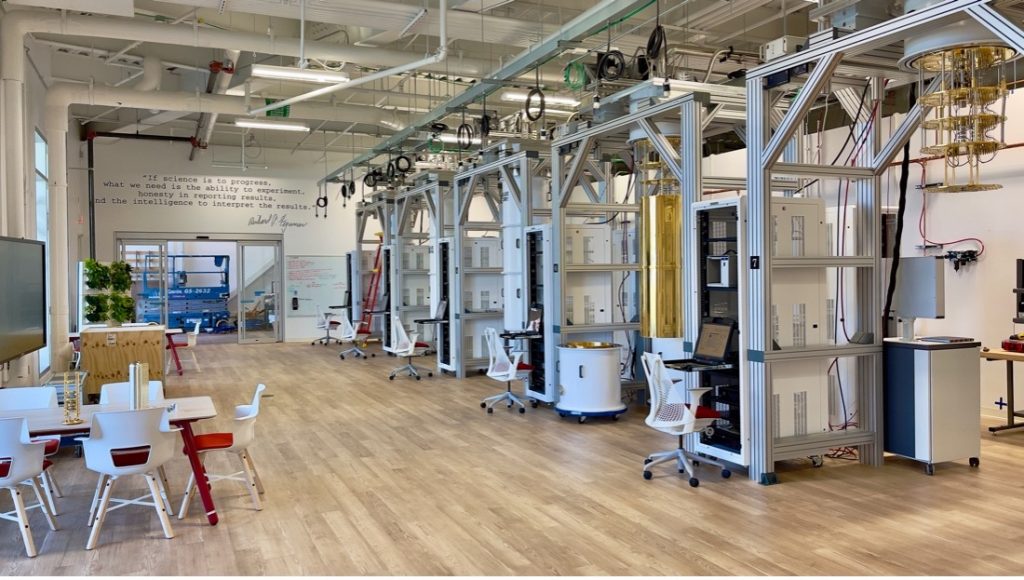
The new SQMS laboratory at Fermilab where students attending the USQIS school will engage with quantum professionals during the 10-day program. Photo: Fermilab
The program is part of a national effort set forth by the National Quantum Initiative Act, which allocated more than $1 billion dollars for research in artificial intelligence and quantum information science. Under this act, Congress established five unique National Quantum Information Science Research Centers that are hosted by their respective DOE national laboratories.
Each of these centers leverage the core capabilities and strengths of their host laboratories to investigate ways to advance the field of quantum information science. Researchers aim to harness quantum mechanics to perform computations that would be practically impossible for classical computers and to create ultra-sensitive detectors.
“This week, participants will get a firsthand look at the most cutting-edge science and technology,” said Tahan. “Efforts to educate the next quantum workforce are essential in meeting the nation’s growing demands for viable quantum technologies.”
The Superconducting Quantum Materials and Systems Center at Fermilab is supported by the DOE Office of Science.
The Superconducting Quantum Materials and Systems Center is one of the five U.S. Department of Energy National Quantum Information Science Research Centers. Led by Fermi National Accelerator Laboratory, SQMS is a collaboration of 30 partner institutions—national labs, academia and industry—working together to bring transformational advances in the field of quantum information science. The center leverages Fermilab’s expertise in building complex particle accelerators to engineer multiqubit quantum processor platforms based on state-of-the-art qubits and superconducting technologies. Working hand in hand with embedded industry partners, SQMS will build a quantum computer and new quantum sensors at Fermilab, which will open unprecedented computational opportunities. For more information, please visit sqmscenter.fnal.gov.
Fermilab is supported by the Office of Science of the U.S. Department of Energy. The Office of Science is the single largest supporter of basic research in the physical sciences in the United States and is working to address some of the most pressing challenges of our time. For more information, visit science.energy.gov.

